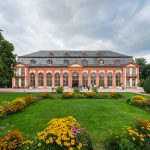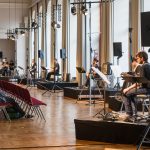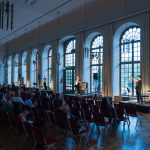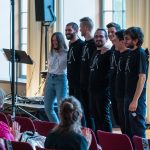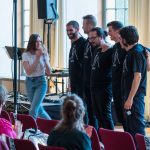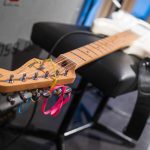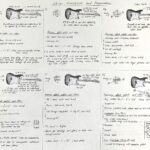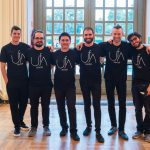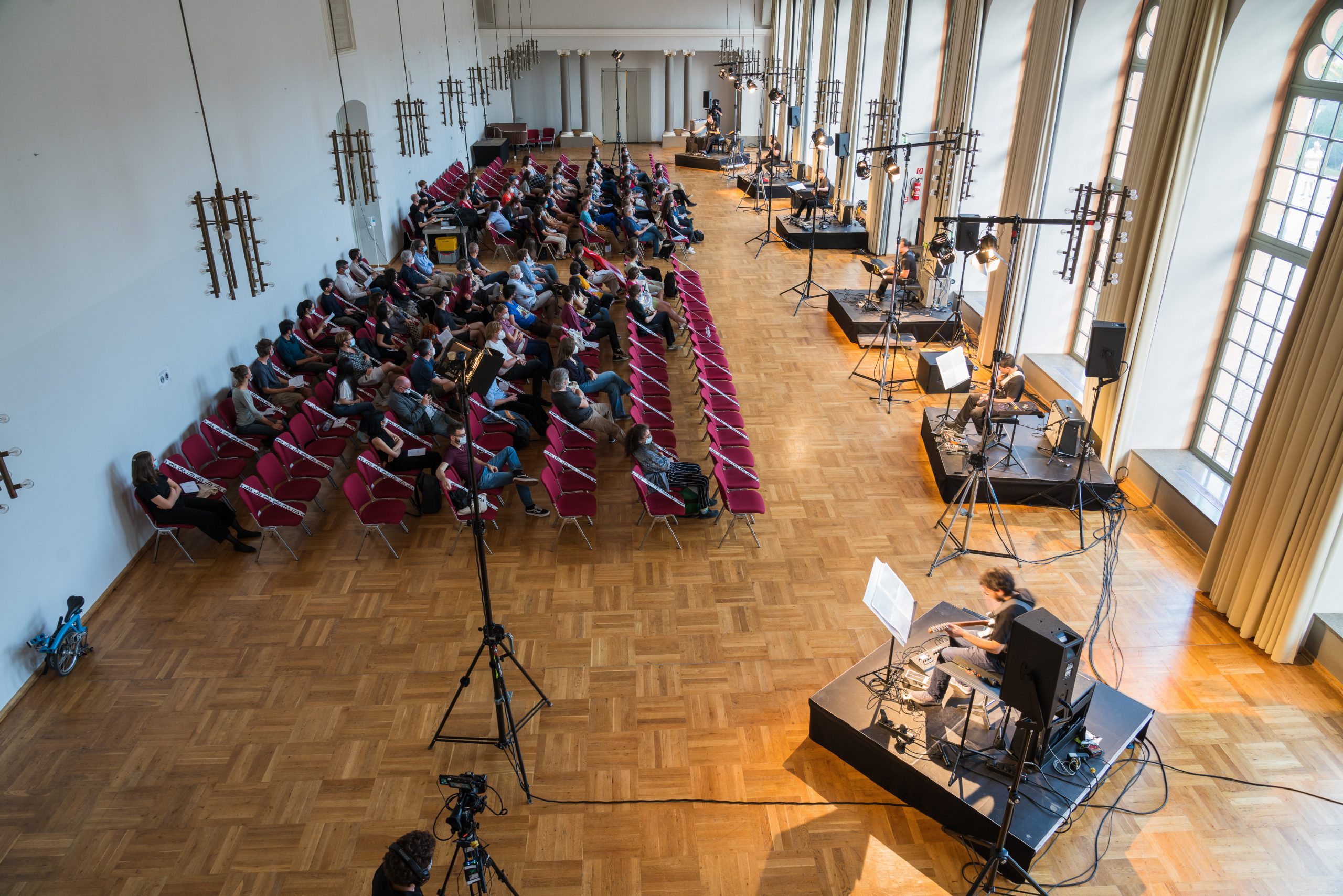
Elena Rykova about Asymptotic Freedom
What is special about composing for electric guitar?
Elena Rykova: I guess it will be a different answer for each person, but for myself it’s a personal passion for the instrument. I had been a classical piano player before I seriously dived into composition. But despite the fact that I spent a lot of hours with the piano, I always had this passion and a dream to play the guitar. I had a classical guitar at home, but no one taught me professionally how to play it. So I never really learned it, but I always wanted – like all kids in school – to have a band. And all these things affected me on an emotional level when I think about this instrument. In a way, it’s a very special instrument to write for, because it’s not only the compositional process but all the background I have in mind: music that affected me as a person, which is not classical music, which is not new music, but rock music, alternative music, pop music, everything we hear on a daily basis, even if we actually don’t aim to listen to music. We are walking around and there are always songs to listen to and most of them are set with guitars. So, writing for it was like taking into consideration all these aspects as well as historical and new music aspects, new techniques. But at the same time, the general history of the electric guitar and my personal history of the instrument, of its sound and of all different (rock) musicians and performers. It’s a very, very complex and huge world.
In a sense, it’s both the possibility and the difficulty to get rid of the historical background of the electric guitar, to use it and to free yourself from it at the same time?
ER: Absolutely. To absorb it, be aware of it and also to allow myself to get into dialogue with it, like in Asymptotic Freedom II. There are a lot of different sections, and some of the sections are really traceable like a ghost, the background or the connection with a certain type of guitar music. I am very curious about people’s reaction to those moments.
What are the unique possibilities and particular challenges of the instrument?
ER: Concerning Asymptotic Freedom II: six guitars at the same time. It’s a huge macro setup because every single guitarist not only has an instrument but also ten pedals each. And each musician is different, with a different educational background. And as we found out, the pickups of the instruments are also very different. They influence certain harmonic aspects of the feedback.
So it’s like an ongoing research. I’m also working with unstable material and singular preparations with rubber bands for each guitar. When I was composing the piece at home, I just had one guitar. It was the second big piece I was composing for nine months, but the project started even a year and a half ago, so it became part of my life. And while I was composing it, I constantly changed from one set up to another, from one preparation to another, trying to embody the instrument and to play it by myself. Though I’m not a guitar player this is an important aspect of composing for me: I have to be connected to it with my body. I have to experience it, which makes it difficult for some kinds of instruments, e.g. wind or brass instruments. It’s a different type of connection for me. Maybe it’s more challenging than the connection with string instruments, a guitar or a piano, which I can literally take in my hands and produce sounds. It’s basically a question of mastering the instrument which demands years of playing, years of practicing. So I had to develop my own ways of playing the instrument. This is where preparations came in handy, because once the guitars are prepared, I can actually feel free to jam, to improvise. And this was like a door that allowed me to step confidently into this world of the electric guitar, starting to be in dialogue with other types of playing that I cannot do myself. This is where the collaboration with the performers came in as well. Without it the piece would be entirely different. Actually, even without having a year of pandemic the piece would be entirely 4different. And in this weird way, I’m happy that I had this year to work on the piece together with six guitar players.
Did the pandemic also change performative aspects of the piece?
ER: At the beginning we were thinking of making a concert in a gallery space where each musician would have his own room, while all rooms would be connected somehow, so people would be able to walk around from one room to another. But after a year of sitting alone at home, this concept felt so strange and even ‘unfriendly,’ that I realized very quickly the music is demanding all players to be together in an intimate setting. Now they will be playing all together in the same room, and the audience will have to be in the same room as well, sitting and listening very carefully without walking around and making noises. The sound and the immersive aspect of sound are the most important in Asymptotic Freedom II. The piece became a portal for me to escape from the room I was sitting in for a year and a half. It became like a metaphysical space where all of us met each other, six guitar players and me, because beforehand they were all recording their parts in their own countries, in their own rooms, and then I mixed them all together. That was our first meeting, but a virtual one. And now, it will be a real one. Unlike Asymptotic Freedom I it won’t be 12 minutes long, but an hour, maybe longer because some of the sections can develop an own life due to the nature of the material.
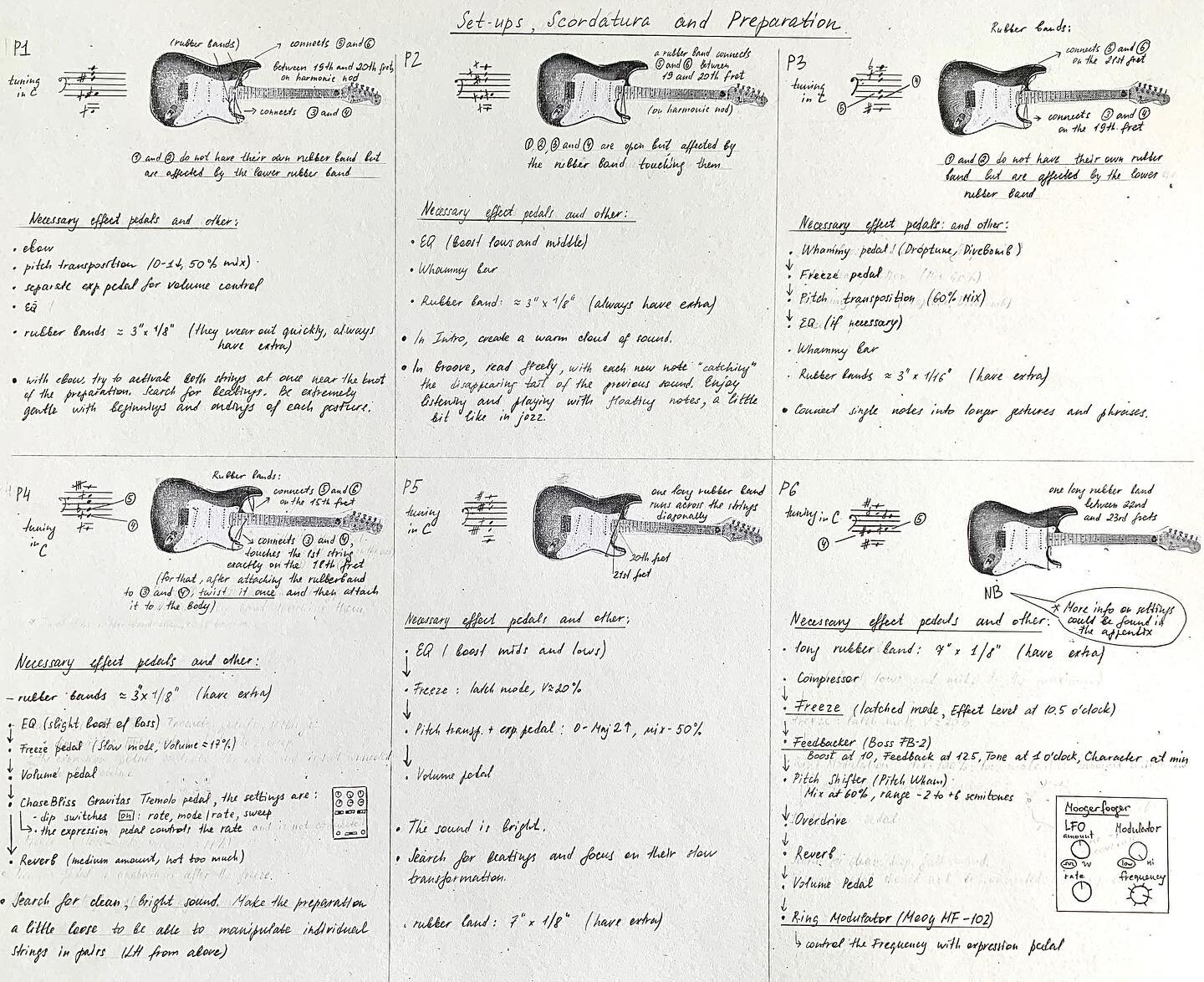
© Elena Rykova

Elena Rykova
Composer, visual and performance artist. Currently based in Boston.
Born in 1991, in Ufa, Russia, I studied piano, composition and conducting at music college. After graduation in 2010, I decided to continue as a composer in Moscow State Conservatory with prof. Yuri Kasparov for the next five years. In 2015 I started my master program in composition at Hochschule für Musik und Tanz Köln with prof. Johannes Schöllhorn. And since Fall 2016 I am a PhD candidate at Harvard University; after studying composition with prof. Chaya Czernowin and prof. Hans Tutschku, I am now teaching composition in Harvard College.
https://www.elenarykova.rocks/
CALENDAR:
- 26th September 2022 SMC Société de Musique Contemporaine (Lausanne, CH)
- 23rd September 2022 Zurich University of the Arts (Zurich, CH) – Swiss Premiere
- 10th August 2021 Darmstadt Ferienkurse (Darmstadt, DE) – Premiere
